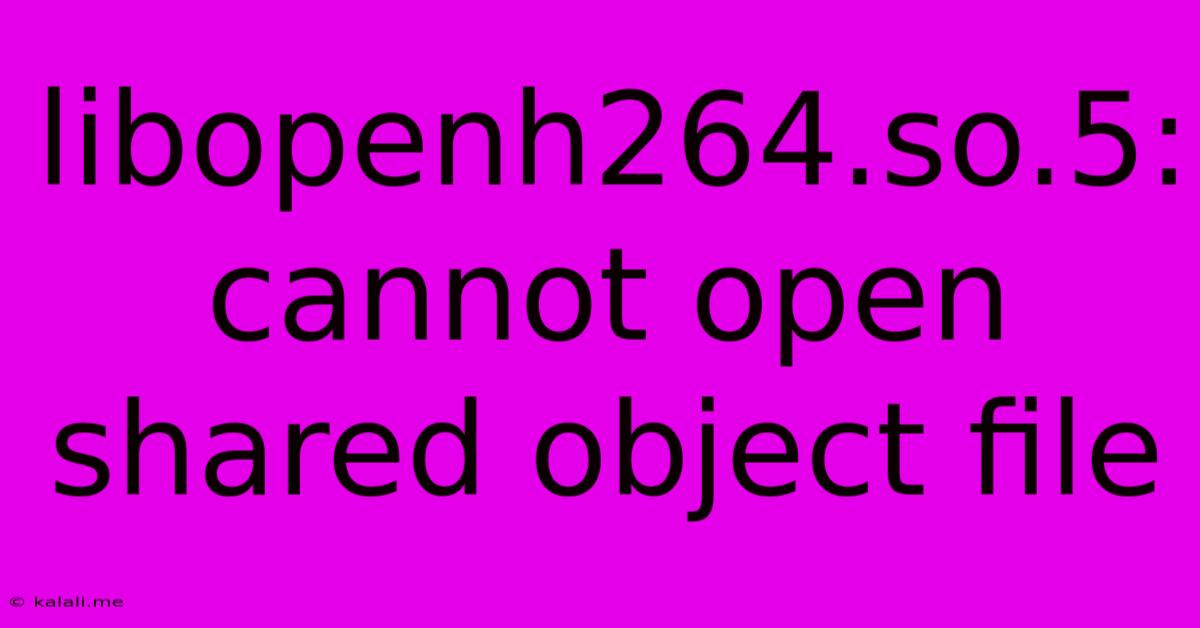Libopenh264.so.5: Cannot Open Shared Object File
Kalali
Jun 07, 2025 · 3 min read

Table of Contents
Libopenh264.so.5: Cannot Open Shared Object File: A Comprehensive Troubleshooting Guide
This error, "libopenh264.so.5: cannot open shared object file," is a frustrating problem often encountered when running applications that rely on the openh264 library. This guide will walk you through understanding the error, identifying its cause, and implementing effective solutions. This frustrating issue arises when your system cannot locate the necessary shared library file (libopenh264.so.5) required by your application. This means your program can't access the functions it needs to operate correctly. Let's dive into the troubleshooting steps.
Understanding the Error
The error message clearly states that the system is unable to find the libopenh264.so.5 file. Shared object files (.so on Linux and other Unix-like systems, .dll on Windows) are crucial components that contain functions used by multiple programs. When an application attempts to run and requires a function from this library, the operating system searches for the library file in predefined locations. If it's not found, the error appears. This typically happens because the library is missing, improperly installed, or the system's library path is incorrectly configured.
Common Causes and Solutions
Several factors could lead to the "libopenh264.so.5: cannot open shared object file" error. Let's examine them systematically:
1. Missing Library File:
- Solution: The most straightforward solution is to install the
libopenh264package. The exact command depends on your distribution:- Debian/Ubuntu:
sudo apt-get update && sudo apt-get install libopenh264-dev - Fedora/CentOS/RHEL:
sudo yum install libopenh264-devel - Arch Linux:
sudo pacman -S libopenh264 - Other distributions: Consult your distribution's package manager documentation. You might need to search for a package named
libopenh264,openh264, or something similar.
- Debian/Ubuntu:
2. Incorrect Library Path:
- Solution: The system might not know where to look for the library even if it's installed. Check your system's library path using the
ldconfigcommand (on Linux/Unix-like systems). If the path to yourlibopenh264.so.5isn't included, you might need to update the library path. This usually involves updating your system's environment variables or usingldconfigto rebuild the library cache after installation.
3. Conflicting Library Versions:
- Solution: Multiple versions of
libopenh264might be installed, causing confusion. Use your package manager to identify and remove any conflicting versions. Ensuring you have only one consistent version installed is vital for preventing this issue.
4. Corrupted Library File:
- Solution: A corrupted
libopenh264.so.5file can lead to this error. Reinstalling the library (as described in solution 1) is the most effective way to address this. If reinstallation doesn't work, consider checking your system's file integrity using tools specific to your distribution.
5. 32-bit vs. 64-bit Incompatibility:
- Solution: The application and the library might have different architectures (32-bit or 64-bit). Ensure that both the application and the
libopenh264library are compatible with your system's architecture. You'll need to install the correct 32-bit or 64-bit version to match your application.
Advanced Troubleshooting Steps
If the basic solutions don't resolve the problem, try these advanced steps:
- Check application dependencies: Examine the application's documentation or code to confirm the exact version of
libopenh264it requires. - Use a debugger: If you have programming experience, use a debugger to pinpoint the exact location where the error occurs within the application.
- Examine system logs: Check your system's logs (e.g.,
/var/log/syslogon Linux) for any additional error messages that might provide clues.
By systematically working through these solutions, you should be able to resolve the "libopenh264.so.5: cannot open shared object file" error and get your application running smoothly. Remember to always back up your system before attempting major changes. If you continue experiencing difficulties, providing details about your operating system, application, and any specific error messages will help in diagnosing the issue more precisely.
Latest Posts
Latest Posts
-
How Long Does Rokokos Retargeting Take
Jun 07, 2025
-
Are Bolted Connections Fixed Or Pinned
Jun 07, 2025
-
How To Take Out A Broken Screw Head
Jun 07, 2025
-
What Angle To Join 3 Right Isosceles Triangles
Jun 07, 2025
-
How To Make A Speaker Louder
Jun 07, 2025
Related Post
Thank you for visiting our website which covers about Libopenh264.so.5: Cannot Open Shared Object File . We hope the information provided has been useful to you. Feel free to contact us if you have any questions or need further assistance. See you next time and don't miss to bookmark.